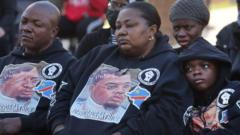The mistrial was announced after a jury failed to reach a verdict in the case against Schurr, who faced charges of second-degree murder for the shooting that occurred on April 4, 2022, in Grand Rapids, Michigan. The shooting of Patrick Lyoya, a 26-year-old Congolese immigrant, incited significant protests, raising critical questions regarding police practices and systemic racism within law enforcement.
Lyoya’s father, Peter, expressed deep pain and disappointment following the ruling, stating, "We will continue to fight until we get the true justice for Patrick." The case has drawn prominent attention, reflecting broader issues related to the treatment of Black individuals during police encounters, particularly during traffic stops.
The confrontation leading to the lethal encounter was documented through multiple sources, including police body cameras and civilian recordings that depicted the moments before the shooting. Schurr’s defense relied on the argument that he feared for his safety when Lyoya allegedly resisted and attempted to take his Taser, describing the moment as a matter of life or death.
Following initial charges, Schurr, who was part of the Grand Rapids police force for seven years, was dismissed from his position. Patrick Lyoya’s family had fled the Democratic Republic of the Congo in 2014, establishing their lives in the U.S., where they hoped to find safety and opportunities. However, the tragic incident has only intensified calls for accountability in policing, especially concerning the treatment of Black motorists.
This mistrial comes on the heels of another high-profile case, where three former Memphis police officers were acquitted of charges related to the beating death of Tyre Nichols, further igniting debates about police brutality and systemic failures in the justice system. As discussions around these pressing issues continue, advocates are calling for policy changes to prevent future tragedies during routine traffic stops.
Lyoya’s father, Peter, expressed deep pain and disappointment following the ruling, stating, "We will continue to fight until we get the true justice for Patrick." The case has drawn prominent attention, reflecting broader issues related to the treatment of Black individuals during police encounters, particularly during traffic stops.
The confrontation leading to the lethal encounter was documented through multiple sources, including police body cameras and civilian recordings that depicted the moments before the shooting. Schurr’s defense relied on the argument that he feared for his safety when Lyoya allegedly resisted and attempted to take his Taser, describing the moment as a matter of life or death.
Following initial charges, Schurr, who was part of the Grand Rapids police force for seven years, was dismissed from his position. Patrick Lyoya’s family had fled the Democratic Republic of the Congo in 2014, establishing their lives in the U.S., where they hoped to find safety and opportunities. However, the tragic incident has only intensified calls for accountability in policing, especially concerning the treatment of Black motorists.
This mistrial comes on the heels of another high-profile case, where three former Memphis police officers were acquitted of charges related to the beating death of Tyre Nichols, further igniting debates about police brutality and systemic failures in the justice system. As discussions around these pressing issues continue, advocates are calling for policy changes to prevent future tragedies during routine traffic stops.






















